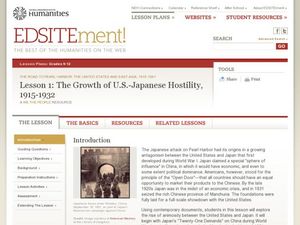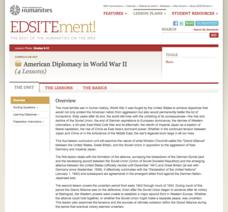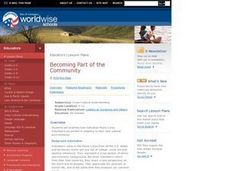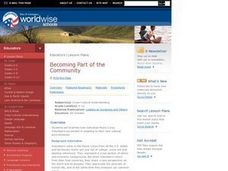Curated OER
America and the Sino-Japanese Conflict, 1933-1939
Students examine the U.S. stance regarding the Sino-Japanese conflict. In this diplomacy lesson, students analyze the sanctions employed by United States on Japan when they took over Manchuria. Students determine how actions by the...
Curated OER
Conflict and Cooperation
Students investigate conflict resolution. For this world conflict lesson, students examine the roles of NATO, the UN, and the EU in diplomacy issues. Students look into the conflict in the Balkans that prompted the Bosnian War.
National First Ladies' Library
State Dinners And Funerals: Protocol And Diplomacy
Learners investigate the use of dinners and funerals as protocol in the life of American Government. They conduct research using the internet and a variety of resources. The information is used in order to answer key questions about...
Curated OER
Spanish American War and Imperialism
In this U.S. history worksheet, students read articles about Spanish American War and U.S. involvement with East Asia. Students then respond to 12 short answer questions.
Curated OER
Secretary of State Seeks Support
Middle schoolers examine the state of diplomacy through an interactive program. They analyze programs by the United States government to protect Americans. They discover some of the world's diplomats and their responsibilities.
Curated OER
The Growth of U.S.-Japanese Hostility, 1915-1932
Young scholars explore the relationship between Japan and the United States between 1915 and 1932. In this diplomacy instructional activity, students examine the Open Door Policy, 21 Demands, and the invasion of Manchuria by Japan. Young...
Curated OER
Bulldozers at the Door
Students investigate current event issues in Zimbabwe. For this global issues lesson, students visit selected Web sites to determine why thousands of citizens were evacuated from their homes. Students examine the bureaucratic upheaval...
Curated OER
Introduction to the Early Origins of the Cold War
In this Cold War worksheet, students read a 4-paragraph selection about post World War II diplomacy and then list key dates and events noted in the selection.
National Endowment for the Humanities
American Diplocmacy in World War II
The end of World War II saw the world deeply changed over the last few years. Four thorough lessons explore post-war Europe, America, and Asia through reading assignments and discussion questions about the Grand Alliance and the signing...
Curated OER
Thaw in the Cold War: Eisenhower and Khrushchev at Gettysburg
Middle schoolers discover how President Eisenhower's brand of diplomacy at this Pennsylvania farm temporarily eased the tensions of the Cold War.
Curated OER
Aftershocks
Pupils explore how the recent earthquake in Pakistan has resulted in temporary diplomacy between Pakistan and India.
Curated OER
Tragedy at Sea
Students explore the recent Russian submarine tragedy. They examine the facts related to the vessel's sinking, then research the opinions of others regarding this event. They explore the impact this event has on their world.
Curated OER
Becoming Part of the Community
Students read narratives by Peace Corps volunteers and examine how they succeeded in adapting to living in a new cultural environment. They identify attitudes and actions that promote having a positive experience in a foreign country.
Curated OER
Recurring Nightmares
Does history really repeat itself? Encourage your middle and high schoolers to answer this age-old question by reading the attached articles on the Cuban Missile Crisis of 1962 and the Iraq Crisis of 2002. How similar or different are...
Humanities Texas
A President's Vision: George Washington
Who knew that one poster about George Washington could have so many learning possibilities attached to it? Here you'll find an attractive learning display on the first president of the United States, as well as worksheets and...
Curated OER
The Monroe Doctrine: Whose Doctrine Was It?
Was James Monroe the sole contributor of the Monroe Doctrine? Young scholars study the doctrine and cite evidence to show contributions of John Quincy Adams and Thomas Jefferson in its formulation.
National Endowment for the Humanities
The New Order for "Greater East Asia"
Sometimes the New Order becomes synonymous with its implications for European countries, but what about its consequences for East Asia? The final instructional activity in a four-part series teaches scholars about World War II. High...
Curated OER
Becoming Part of the Community
Students identify how various cultures are similiar. As a class, they read an essay of a Peace Corps volunteer being integrated into their new community. In groups, they take the elements from the story and put them into different...
National Endowment for the Humanities
Victory and the New Order in Europe
A New Order in Europe calls for a new lesson plan! This third plan in a series of four sequential lessons encourages high schoolers to read primary sources about the development of the New Order and follow up their knowledge with a...
Curated OER
World War II - War Comes to Hawaii
Ninth graders use geographic representations to organize, analyze, and present information on people, places, and environments. They use tools and methods of geographers to construct, interpret, and evaluate qualitative and quantitative...
Curated OER
The Worldly Philosophers by Robert Louis Heilbroner
In this online interactive reading comprehension worksheet, students respond to 15 multiple choice questions based on The Worldly Philosophers. Students may submit their answers to be scored.
Curated OER
1914-1918: The World at War
Thorough and engaging, this presentation details the causes and contexts of World War I on all fronts. It covers "the spark" that began it all, as well as the effect of technology on weaponry and the role of women on the home front and...
National Endowment for the Humanities
Lesson 3: Britain, Napoleon, and the American Embargo, 1803–1808
While the French were once the allies of Americans, the Napoleonic Wars saw the United States almost drawn into a war with its one-time friend. Wars in Europe threatened to draw in the early republic. A primary source-based activity...
National Endowment for the Humanities
Lesson 2: The United States, France, and the Problem of Neutrality, 1796–1801
While the French Revolution could be considered inspired by the American Revolution, it created thorny problems for the new United States. Should the United States get involved and be drawn into a European drama? Was the US strong...
Other popular searches
- Dollar Diplomacy
- Big Stick Diplomacy
- Moral Diplomacy
- International Diplomacy
- New American Diplomacy
- Roosevelt Diplomacy
- Government Diplomacy
- Ben Franklin and Diplomacy
- Latin American Diplomacy
- Diplomacy Worksheets
- Taft Dollar Diplomacy
- Wilson Missionary Diplomacy

























